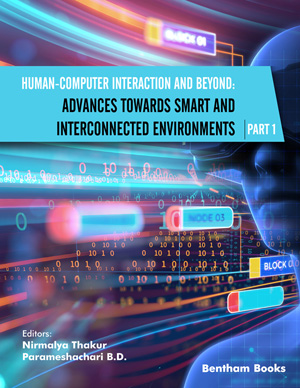[1]
S. Brin, and L. Page, "The anatomy of large-scale hyper textual web search engine", Computer Networks and ISDN System, vol. 30, no. 1-7. 1998, pp. 107-117.
[2]
S. Gupta, and D. Garg, "Comparison of semantic and syntactic information retrieval system on the basis of precision and recall", Int. J. Data Engineering (IJDE), vol. 2, no. 3, pp. 93-101, 2011.
[3]
T. Berners-Lee, J. Hendler, and O. Lassila, "The Semantic web", Sci. Am., vol. 284, no. 5, pp. 34-43, 2001.
[4]
X. Shen, Y. Xu, J. Yu, and K. Zhang, "Intelligent search engine based on formal concept analysis In", IEEE International Conference on Granular Computing, 2007pp. 669-669
[5]
D. Ding, J. Yang, Q. Li, L. Wang, and W. Liu, "Towards a flash search engine based on expressive semantics In", Proceedings of International World Wide Web Conference on Alternate Track, WWW Alt, New York, 2004pp. 472-473
[6]
K. Dahlgren, and D. Albro, "Cognition Technology resources
overview semantic Map system architecture and tools at cognition
giving new meaning", , 2008.
[7]
T.R. Gruber, "A translation approach to portable ontology Specification", Knowl. Acquis., pp. 199-220, 1993.
[8]
S.S. Laddha, and P.M. Jawandhiya, "Semantic search engine", Indian J. Sci. Technol., vol. 10, no. 23, pp. 1-6, 2017.
[9]
G. Madhu, A. Govardhan, and T.V. Rajinikanth, "Intelligent semantic web search engines: a brief survey", Int. J. Web & Semantic Tech. (IJWesT), vol. 2, no. 1, pp. 34-42, 2011.
[10]
D. Hawking, N. Craswell, P. Bailey, and K. Griffiths, "Measuring search engine quality", Inf. Retrieval, vol. 4, pp. 33-59, 2001.
[11]
M. Tang, and Y. Sun, "“Evaluation of web-based search enginesusing user effort measures”", Lib. and Inform. Sci. Res. Electronic J.(LIBRES), vol. 3, no. 2, 2003.
[12]
S. M. Shafi, and R. A. Rather, "Precision and recall of five search engines for retrieval of scholarly information in the field of biotechnology", In: Webology, vol. 2, no. 2. 2005.
[13]
H. Girit, R. Eberhard, B. Michelberger, and B. Mutschler, "On the precision of search engines: Results from a controlled experiment", In: W. Abramowicz, D. Kriksciuniene, and V. Sakalauskas, Eds., Business Information Systems. BIS 2012. Lecture Notes in Business Information Processing., vol. 117. Springer: Berlin, Heidelberg, 2005.
[14]
R.A. Rather, F.A. Lone, and G.J. Shah, Overlap in web search results: a study of five search engines., Library Philosophy and Practice, 2008.
[15]
D. Tumer, M.A. Shah, and Y. Bitirim, "An empirical evaluation on semantic search performance of keyword-based and semantic search engines: Google, Yahoo, Msn and Hakia In", Fourth International Conference on Internet Monitoring and Protection, 2009pp. 51-55
[16]
B.T.S. Kumar, and S.M. Pavithra, Evaluating the searching capabilities of search engines and metasearch engines: A comparative study., Ann. Lib. Inform. Studies, pp. 87-97, 2010.
[17]
M.O. Andago, T.P.L. Phoebe, and B.A.M. Thanoun, "Evaluation of a semantic search engine against a keyword search engine using first 20 precision", Proceedings of the 29th Annual International Conference on Research and Development in Information Retrieval, ACM Press, pp. 735-746, 2010.
[18]
M.M. Qureshi, B. Asma, and H.U. Khan, "Comparative analysis of semantic search engines based on requirement space pyramid", Int. J. Future Comp. Comm., vol. 2, no. 6, pp. 562-566, 2013.
[19]
Y.S. Negi, and S. Kumar, A comparative analysis of keyword and semantic based search engines. InIn Intelligent Computing, Networking, and Informatics,, 2014, pp. 727-736.
[20]
J.A. Khan, D. Sangroha, M. Ahmad, and M.T. Rahman, "A performance evaluation of semantic-based search engines and keyword-based search engines", In Medical imaging, m-health andemerging communication systems (MedCom), IEEE International Conference, 2014pp. 168-173
[21]
L. Ding, T. Finin, A. Joshi, Y. Peng, R.S. Cost, J. Sachs, R. Pan, P. Reddivari, V. Doshi, and P. Reddivari, "Swoogle: A search and metadata engine for the semantic web", Proceedings of ACM Conference on Information and Knowledge Management (CIKM’04), 2004pp. 652-659 Washington DC, USA
[22]
C. Mangold, "A survey and classification of semantic search approaches", Int. J. Metadata Semant. Ontol., vol. 2, no. 1, pp. 22-34, 2007.
[23]
Y. Qu, G. Cheng, H. Wu, W. Ge, and X. Zhang, Seeking Knowledge with Falcons., Semantic Web Challenges, 2008.
[24]
P. J. Hane, "Cognition giving new meaning", J. Nat. Lang. Processing, pp. 90-99, 2010.
[25]
S. Mouhim, A. El aoufi, A. EI Mezouary, M. Edahibi, H. Eddouzi, C. Cherkaoui, and D. Mammas, "“A practical and functional evolution of some semantic search engines”", Int. J. Comp. Sci. and Inform. Tech. Security (IJCSITS), vol. 2, no. 5, 2012.
[26]
K. Jarvelin, and J. Kekalainen, "Cumulated gain based evaluation of IR Techniques", ACM Trans. Inf. Syst., vol. 20, no. 4, pp. 422-446, 2002.
[27]
D. Yin, C. Nobata, and J.M. Langlois, Yichang et al"Ranking relevance in yahoo search", Proceeding of the 22nd ACM SIGKDD International Conference on Knowledge Discovery and Data Mining, 2016pp. 323-332
[28]
Y. Wang, L. Wang, Y. Li, D. He, W. Chen, and T.Y. Liu, "A theoretical analysis of NDCG ranking measures In", Proceedings of the 26th annual conference on Learning Theory, 2013
[29]
B. Chandrasekaran, J.R. Josephson, and V.R. Benjamins, "What are ontologies, and why do we need them?", IEEE Intell. Syst., vol. 14, no. 1, pp. 20-26, 1999.



















